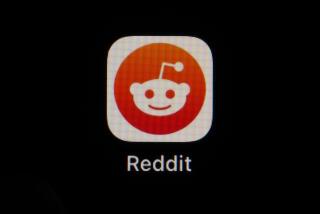For Google, Auction Method Mirrors Image
Google may make bidding for shares in an initial public offering as easy as shopping for a hotel room online. The Mountain View, Calif.-based Web search firm said Thursday that it planned to go public in an unusual “Dutch auction” that would allow investors to place bids for shares over the Web, by phone or by fax.
Google Inc. executives said their aim was to have an IPO that was fair to large and small investors alike. “Understand that we and our underwriters will reject bids that we believe are speculative or manipulative,” the company said in a regulatory filing.
The plan is in keeping with Google’s populist image, as Main Street buyers have often been shoved aside by insiders and Wall Street big wheels when a hot IPO hits.
“The intent is to avoid the perception of any of the inequities that may or may not have existed with prior IPOs,” said Mark Basham, an equity analyst at Standard & Poor’s.
Typically, the shares in initial public offerings are allocated by the investment bankers who manage the deal before the company actually starts trading publicly. Between 5% and 15% of any deal goes to “friends and family” programs in which the issuing companies choose who gets stock, said Joel Reed of Relational Advisors, a small investment bank in San Diego.
Securities firms have been criticized for steering IPO shares to favored institutional buyers and shutting out everyone else. The favored few can then resell their shares within hours after trading is launched, often at a massive profit. Others get stuck paying higher prices in the common market.
During the 1990s stock boom, IPO profits fueled a practice known as “spinning,” in which banks doled out shares in hot new issues to executives of other companies in hopes of winning their financing business.
Though the IPO frenzy has ended, the era is recalled daily in the trial of former Credit Suisse First Boston investment banker Frank Quattrone, who is accused of trying to obstruct a federal probe into IPO allocations.
CSFB agreed to pay $100 million in 2001 to settle allegations that it forced customers to pay big trading commissions in exchange for IPO shares. The bank has now teamed with Morgan Stanley to underwrite the Google IPO.
The Google offering will follow the Dutch auction method developed by San Francisco investment bank W.R. Hambrecht & Co., which modeled it after the way the Dutch broker flower sales. Investors who want in on the IPO will submit bids, saying how many shares they want and at what price. Those bids will be used to set a price that ensures all the stock is sold.
The process is designed to prevent big price swings after the offering by determining demand for the stock before it’s sold, rather than after. And it ensures that if the price is bid up, the company -- and not favored investors -- will get the benefit.
“A Dutch auction is better for individual investors and better for the company,” said Peter Cowen, a Los Angeles-based investment banker.
The offering date has not yet been set. Once it is, bidders will be asked to fill out an electronic form to get a “unique bidder ID” allowing them to participate.
“This is a huge validation for the Dutch auction process,” said Tom Taulli, an instructor at USC’s Marshall School of Business and author of “Investing in IPOs.” “I wouldn’t be surprised to see other companies, especially in the tech sector, say, ‘Hey, let’s try it this way.’ ”
Times staff writer Walter Hamilton in New York contributed to this report.






